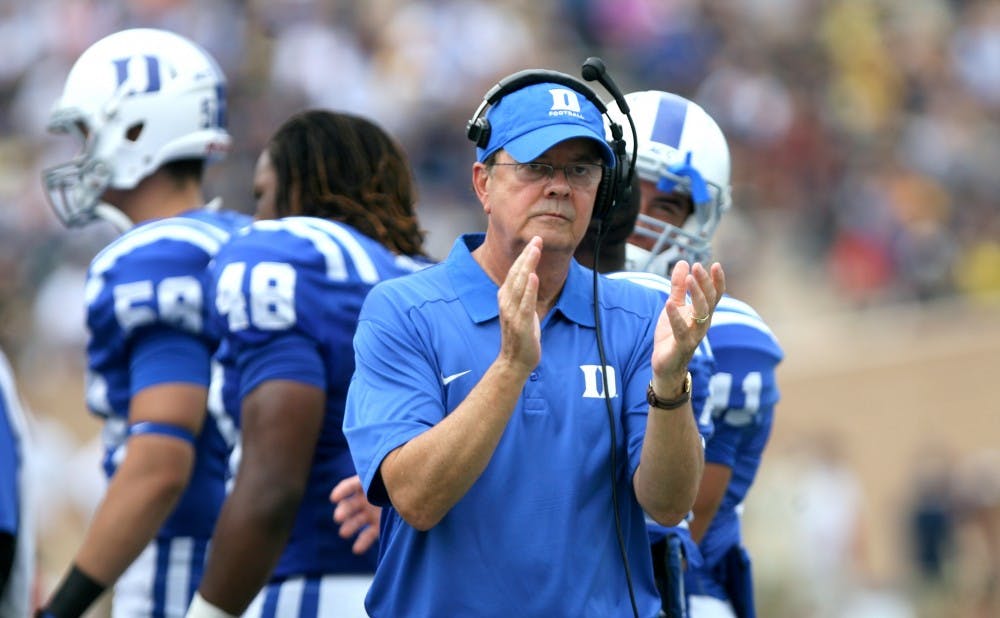David Cutcliffe interviewed with many people during the selection process for the new head coach of Duke football in 2007. He talked to then-Athletics Director Joe Alleva. He talked to President Richard Brodhead. He talked to linebacker Vincent Rey, who would become Cutcliffe's first team captain and now plays for the Cincinnati Bengels.
And then Cutcliffe talked to men’s basketball head coach Mike Krzyzewski.
The 2006-07 season had been Krzyzewski’s 27th at Duke. When Cutcliffe and Krzyzewski sat down to chat, Krzyzewski was an established NCAA tournament presence, making the Big Dance for all but four seasons during his tenure in Durham. He was an 11-time ACC regular-season champion who had also won the ACC tournament nine times. Krzyzewski had won three NCAA national championships and two Olympic gold medals as an assistant coach for the United States men’s national team.
Duke football, meanwhile, had reached a new low. Ted Roof, Cutcliffe’s predecessor, had compiled a 6-45 record during his time at the helm of the Blue Devils, including a 1-11 record during his final year. Two of Roof's four seasons were winless ones. Duke had not won an ACC game since beating Clemson on Nov. 13, 2004 and had a spot reserved for them in the basement of the Coastal Division every year.
But that all changed under Cutcliffe.
Fast-forward six years, and No. 20 Duke is going to its second bowl game in as many seasons. First, the Blue Devils will represent the Coastal Division—which they won outright—and face No. 1 Florida State in the ACC championship game Saturday. Whether or not they end up hoisting the trophy after battling the Seminoles, however, the accolades are never-ending for this team.
But the most important number of the entire season is six.
It took six seasons for Cutcliffe to turn Duke into a winner—the same number it took Krzyzewski to do the same with his basketball program after taking the reins in 1980.
Before Krzyzewski, Bill Foster had coached the Blue Devils from 1975-80. Overall, Foster led them to a 113-64 record, two ACC Championships and a national championship appearance in 1978. Foster resigned after the 1979-80 season to become the head coach at South Carolina, bequeathing a solid team to Krzyzewski.
But transition was tough for Krzyzewski and Duke. All-American Mike Gminski had graduated in 1980, and at the time he was Duke’s career leader in points, rebounds and blocks. With a thinning squad and without an established recruiting presence, Krzyzewski went 38-47 overall and 13-29 in the ACC in his first three seasons, missing the NCAA tournament in each.
Krzyzewski improved during the following two seasons, mostly due to his 1982 recruiting class. Rookies Jay Bilas, Johnny Dawkins and Mark Alarie, and later Tommy Amaker in 1983, were the beginnings of a core that led Krzyzewski to his first NCAA berths in 1982 and 1983.
But Krzyzewski’s sixth season in Durham was one that left his mark indelibly on the program.
Only three losses, the second fewest in Duke history.
A 21-game winning streak, the school record at the time.
The ACC regular season championship.
The ACC Tournament championship.
Dawkins won Naismith College Player of the Year.
Duke reached the national championship game.
And since then—well, we know the story, right? Krzyzewski is, quite simply, the greatest of all time. But we tend to forget that it took him awhile to get there—six seasons, to be exact. In our heads, the early-Krzyzewski era is often lost in the run of seven Final Four appearances in nine years that began with that 1986 team. There have been more than enough ACC championships, NCAA tournament appearances and national championships to overshadow the flaws of the Blue Devils in the early 80s.
Now, Cutcliffe's redesign of Duke football is following the same blueprint Krzyzewski used to kick off his epoch of basketball greatness: recruit, develop a solid core and keep on recruiting. Eventually, a top recruiting class will be a given each year and the core will transform into a deep, balanced roster. In Cameron Indoor, Dawkins gave way to Elton Brand who gave way to J.J. Redick who gave way to (possibly) Jabari Parker, who go on to define eras of Blue Devil basketball.
It’s easy to argue, however, that Cutcliffe has done more in his first six seasons than Krzyzewski did.
Krzyzewski adopted a fine squad; meanwhile, the current upperclassmen on the football team took a chance on an absolutely abysmal Duke team. They heard Cutcliffe speak of his plan to rebuild Blue Devil football from the ground up, and they—almost by miracle—believed in him. Now, the core of Ross Cockrell, Jamison Crowder and Anthony Boone are paving the way for freshmen Bryon Fields, Breon Borders and Deondre Singleton. In a few seasons, these rookies will compose a new core, and if Cutcliffe’s plan is successful, they will lead even better recruiting classes through Wallace Wade for years to come.
And now, during Cutcliffe’s sixth season, he, too, has impacted Duke irrevocably.
Ten wins, the most in Duke history.
An eight-game win streak, the longest since 1941.
The ACC Coastal Division championship.
An appearance in the ACC championship game.
A school-high 11 All-ACC players.
Consecutive bowl games for the first time ever.
If Cutcliffe has his way, Duke football will eventually reach the heights of consistent greatness that Duke basketball has, and it can certainly get a jumpstart against Florida State Saturday. Win or lose against the Seminoles, however, Cutcliffe's has made the Blue Devils' season nothing short of magical. There may be only two games left to play in 2013, but Coach Cut has lain a foundation for the future of Duke football to follow—in only six seasons.
Get The Chronicle straight to your inbox
Signup for our weekly newsletter. Cancel at any time.

